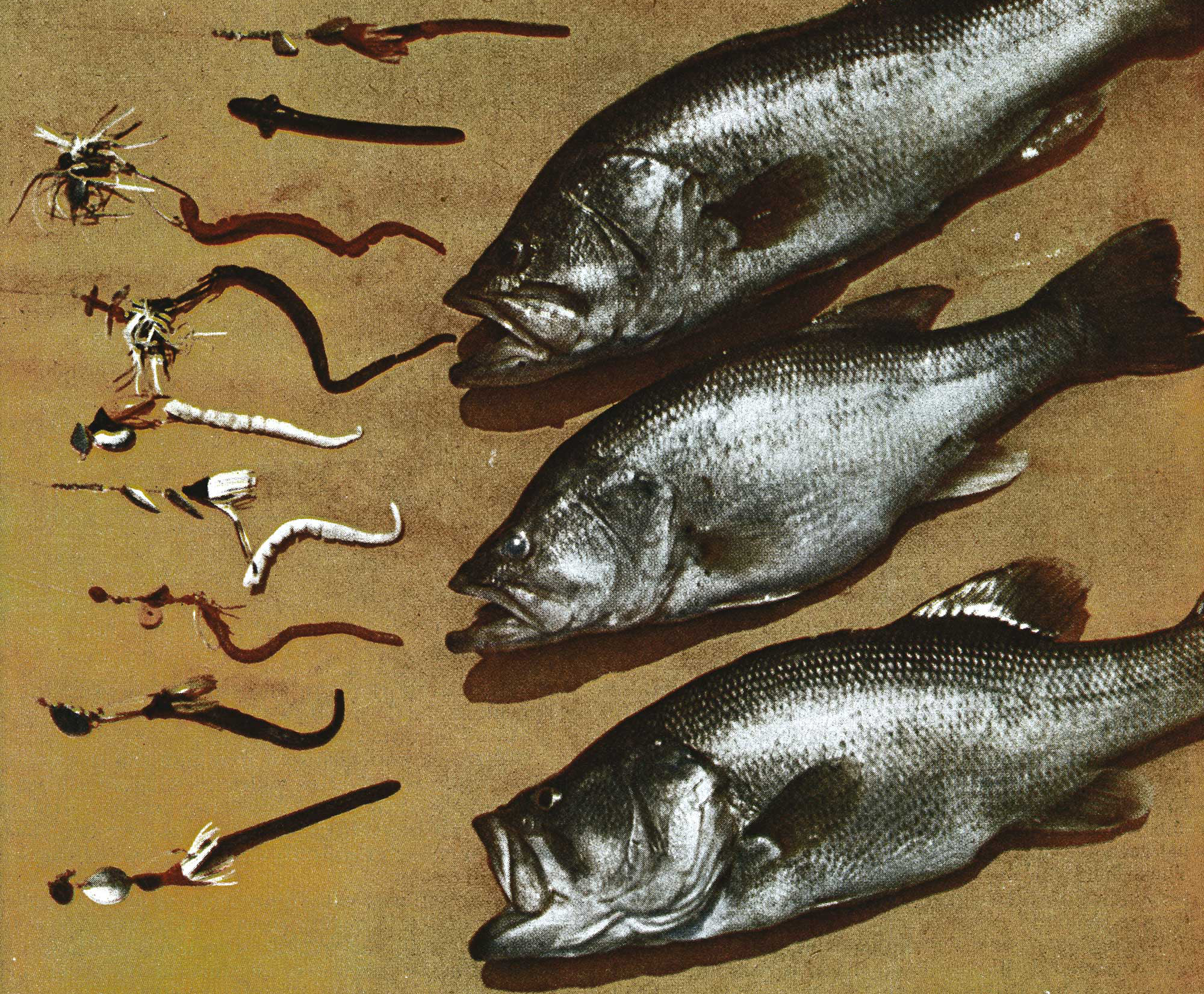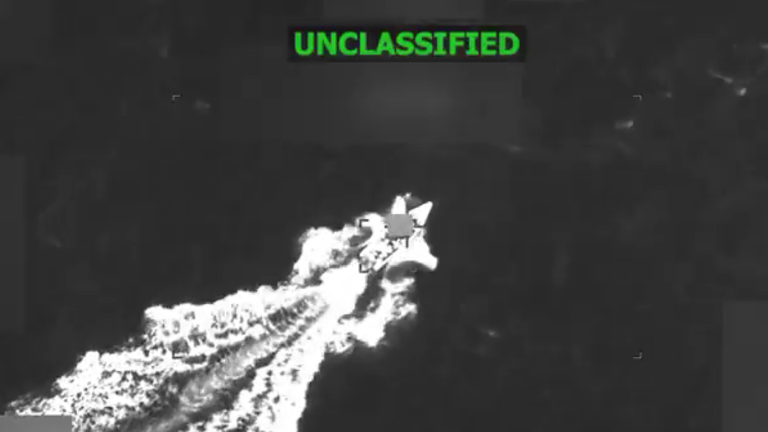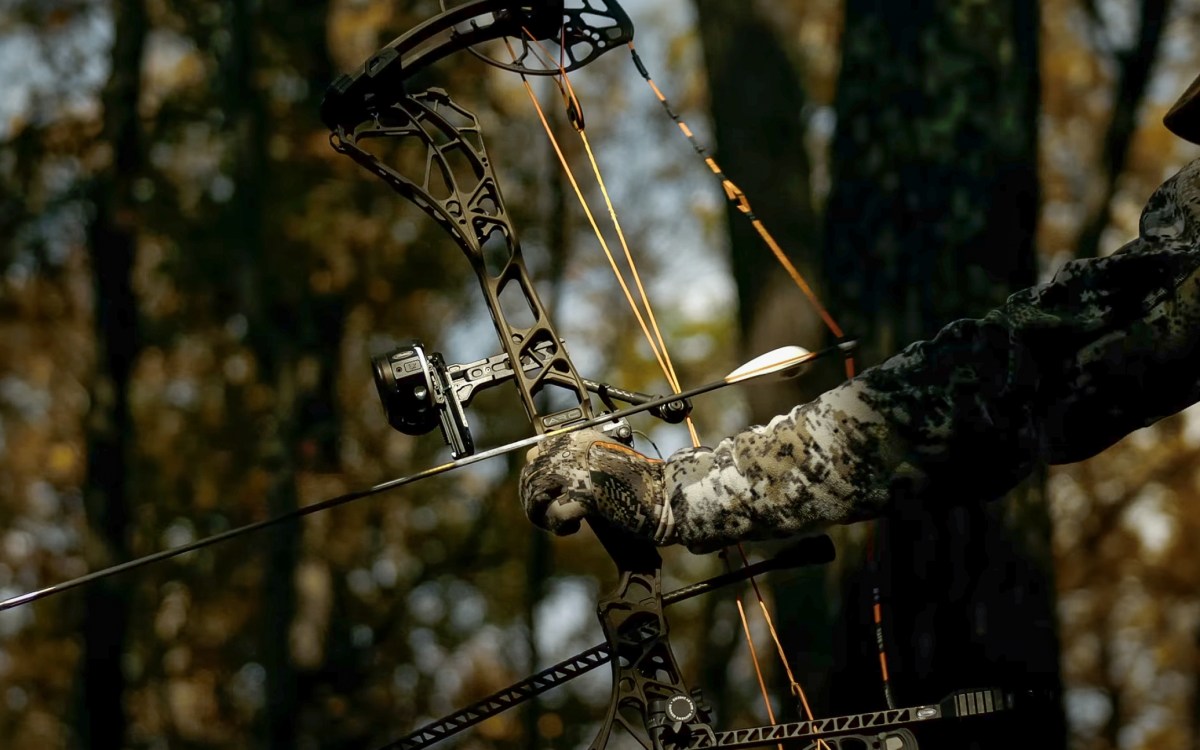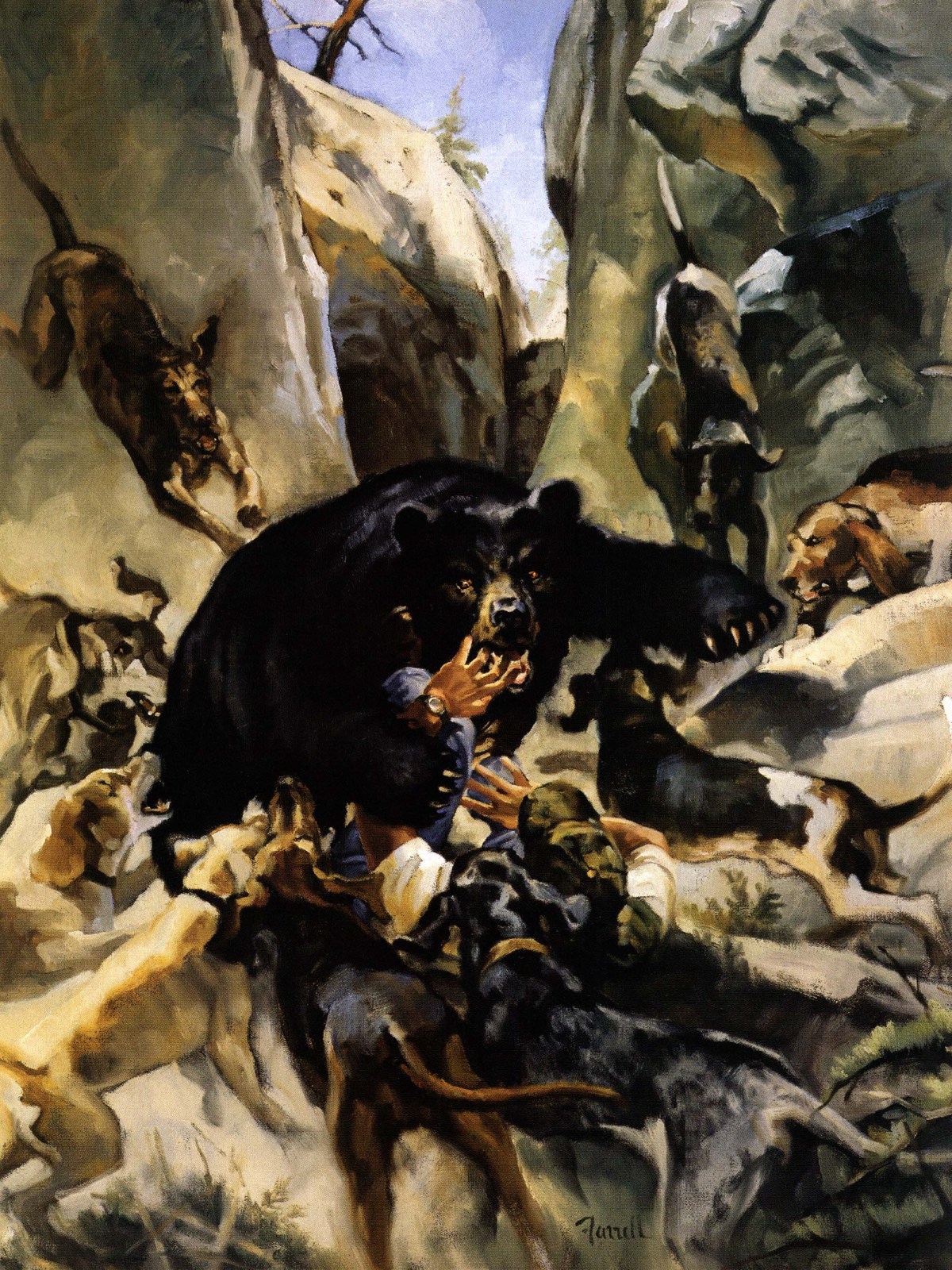Gollywompers: A Secret Old Bait for Giant Bass

This story was originally published in the July 1960 issue of Outdoor Life.
The rim of night was barely cracking loose when Andy killed the motor. “Tie to that scalybark snag straight ahead,” he told me, as he maneuvered the boat with his paddle in this drowned forest off the southern shore of Grenada Lake. While I was tying the craft, I heard the swish of a rod and splash of a lure. Andy tapped me on the shoulder.
“Here, Bob, try this,” he said, plopping a soft, wet object into my hand. It felt like a fistful of snails, and I recoiled slightly. “What is it?”
“A gollywomper. It’s dog-day dynamite,” he said, thumbing the push button on his reel into freewheeling. “Tell you more about it later. A bass has picked up my gollywomper.”
I turned to watch as something moved away slowly, peeling loose coils of monofilament from the reel. About six feet scratched through the guides, and Andy locked the reel. He waited until the line tightened, then swept the rod back over his shoulder. It arched like a new moon.
“He’s a good one,” Andy said. “Watch him jump beyond that cypress log.”
The largemouth came out broadside in a burst of spray, huge and dark-silver in the early light. He crashed back into the lake and put on a terrific surge of power as he tried to tear loose. Andy let the rod dip until the tip touched the water. Then he forced the fish back to the surface, skidded him across the log, and fought him to the side of the boat. I lowered the net into the low, tepid waters of late summer and dipped him up —— a tough, streamlined six-pounder.
I strongly suspect that Andrew Whitaker, who’s in his late 30’s, catches more big bass than any other fisherman of any age in Mississippi. I know that’s saying a mouthful because the Magnolia State is famous for her prolific king-size largemouths, and for the skill of her anglers. During the past two years Andy has taken 627 bass weighing four pounds or better. Some 265 were in the five-pound class, and 72 topped the sixpound mark. All of these whoppers were taken from Grenada Lake, a 65,000-acre flood-control reservoir near the town of Grenada, where Andy lives and edits his weekly newspaper.
I used to live in Grenada before I was transferred to Tennessee, and I got to know the editor in those days. I also relished his tart editorials on conservation malpractices and poor sportsmanship. Even though I like to sample promising waters over the entire Southland, I have found north Mississippi’s bassing opportunities second to none, and I return to Grenada to fish at least every other weekend. I’m a confirmed largemouth angler. That fish is cunning enough, powerful and agile enough, and unpredictable enough to rate my undivided angling attention. At the same time, however, I view with admiration and envy any fisherman whose tactics get better results than mine.
For more than a year I looked on in agony while Andy, a lone wolf, staggered in with his heavy strings of jumbo bass. I kept hankering for an invitation to go fishing with him so I could learn something of his deadly technique. Finally, late one afternoon after a long siege of my bold, blunt hinting, he telephoned my home in Memphis.
“I was wondering if you’d like to go fishing with me tomorrow?” he asked.
“Would I?” I said in as calm a tone as I could manage.
“Might’s well come on down tonight,” he said. “Then we can get an early start in the morning.”
“I’ll start packing as soon as I hang up,” I promised, anxious to start the 100-mile drive south on U. S. Highway 51.
As I walked away from the phone, I suddenly wished he hadn’t waited until mid-August to call me. All sane bass and smart bass fishermen had agreed to call it quits until the first cool nights of September. I included an ultralight spinning rod and reel with heavier equipment, determined to make the most of any bass that might be stupid enough to grab my bait in the torrid heat. If we caught any fish tomorrow, I would consider Andy’s stratagems invincible.
At 3:45 on the morning after the call, the jeep lights came to rest on a little green boat tied in the shelter of a wooded cove. Andy, grabbing the motor, a bristling fistful of rods, paddles, and a tackle box, strode eagerly toward the boat.
“Cut the lights off,” he called over his shoulder. “Can you bring the rest of the stuff?” Only a handful remained.
We putted out of the cove and turned west down the main body of the reservoir. The moonless but starry night left only smudgy landscape silhouettes for Andy to steer by, but they were all he needed. He opened the throttle, and we ran carefree under the canopy of crisp stars.
About three miles down the lake, Andy plunged the boat into a dead forest that had been drowned after the dam was closed. Under his expert handling, the sled-nosed wooden craft twisted and turned and tore its way through the maze of rotting timber and underbrush until we came to that scalybark’ snag.
While Andy was stringing his first bass of the day, I examined the gollywomper. “This think looks like a sports-model eel,” I said. “It is a red one, fully equipped,” he laughed. “I pickle and dye the hog hide, and rig them myself.” The porkrind strip was about six inches long, and it had a red and white skirt about the neck. The head was pierced with a 5/0 weedless hook attached to a No. 3 willow-leaf spinner. I wondered if any bass could resist the delectable morsel, and I started setting up my ultralight tools to find out.
“May, my wife, came into the kitchen one night and saw me dyeing pig skin,” Andy continued, tearing the seal off a fresh sack of North State roll-your-own smoking tobacco. ‘”What kind of gollywomper is that you’re making?’ she asked. ‘This is a green gollywomper,’ I told her, fishing one out of the pot. The name stuck. It’s the best bait I’ve ever used during the doldrums of July and August when bass are deep and dormant.”
The lure is absolutely weedless and, properly weighted, hugs the bottom like a leech, Andy told me. You twitch the rod tip, and a flick and flash of the spinner rouses the largemouth from his siesta just in time to see the fat, fuzzy gollywomper squirming tantalizingly past his nose. He thinks it’s the easiest meal he’ll ever get and gobbles it down.
“You want to give him a little time before you strike, so he can swallow it, leisurely,” Andy added with a deadly chuckle.
Andy hadn’t been paying any attention to what I was doing, but now he suddenly noticed.
“Wait, Bob,” he said in alarm. “Don’t use that toy rod in here. It would be like trying to whip a grizzly bear with a switch. These bass are big and power-packed, and the water is saturated with logs and limbs. When one hits, you’ve got to wrestle him out of the stuff in short order.”
“Oh, I’ll give this a try,” I replied casually, but confidently. I’d whittled down some pretty hefty largemouths with that rig.
“Suit yourself,” he said, sprinkling some North State on a cigarette paper.
I made my first cast and he said, “Goodbye gollywomper.”
Almost immediately something moved off with that lure. When I stung him with the hook, which was the extent of the damage, I saw the bass climb into the branches of a fallen hackberry tree, thrashing like the nozzle of a loose fire hose. The six-pound-test line popped like a cap pistol and snapped back about my shoulders. Andy’s riotous laughter did nothing to salve my injured feelings.
Meekly I said, “I wonder if you could spare another one of those gollywompers for use on heavier equipment?”
“Take a look at my outfit, Bob,” Andy said, and this time I took his advice. His six-foot spin-casting rod had a thick, stiff back, tapering to a slim, fast-action tip. “This is a heavy-duty reel packed with a 20-pound-test line,” he explained. “Anything smaller would be sawed in two when wrapped around a stump or log with a five-pound bass doing the sawing. I use a 4/0 or 5/0 hook, because I’ve had smaller ones straighten or break after a big bass fouled the line close to the hook. Fishermen who don’t have the right tackle don’t take home many of these whopper bass. I learned how the hard way.”
He handed me another gollywomper — a white one this time. Andy seemed to have an infinite supply of these masterpieces fashioned from pork-rind and plastic. This one was mounted on a plain 4/0 hook. The barb of the hook was bent inward to within a quarter inch of the shank.
“Won’t this get hung up a lot?” I asked.
“A little more than the weedless hook, maybe,” he granted. “But it costs only about one tenth as much and will stick fish that the weedguard knocks off.”
Andy handed me a half-ounce sliding sinker. “Thread your line through this,” he said, “and tie it to a snap swivel. The swivel will keep the lure from twisting your line. The heavy sinker will drag your bait to the bottom fast, right down through branches and brush, and will pull it to the bottom again after it climbs over obstacles. The sinker will help you to make long casts with the heavy line, but won’t interfere when a fish picks up the lure. The sinker stays put while the line plays out through the hole.”
I knew by now that I was in the hands of a master, and retooled exactly as he recommended. My mediumweight, closed-face spinning reel was clamped to a springy but powerful seven-foot rod, my first cast was a long one into the edge of a log jam. The gollywomper went straight to the bottom, pulling five or six more feet of line from the reel before I made a clockwise turn of the handle, engaging the line. I moved the rod tip up and down in little jerks, feeling the bait bounce along the bottom, then rise and fall over obstacles. When it hung up, I gave slack and tried again until it came free. I worked the lure in without results and cast again. Out of the corner of my eye, I noticed that Andy was watching me closely.
“I set the drag on my reel so that line won’t strip,” he said casually. “I’ve had a reel spill line when I didn’t want it to-just once.”
Without hesitation I twisted the cover of my reel so tight that the 20-pound-test line would break rather than escape under such tension. Then something bumped my lure.
“Here we go,” I said, unlocking the reel and lowering the rod. The line hissed through the guides. I locked the reel, and the rod bent into a horseshoe. The bass lunged away, and I followed him with the rod. At the moment that I felt something must break, he finally turned and streaked toward us. I recovered line like a madman and had the slack on the spool when he veered off to the left. I pumped the rod and he came out slantwise, wearing the gollywomper like a white goatee. He was almost as large as Andy’s fish. I noticed that the bass was securely hooked through the jaw hinge, and played him in open water until he was so worn he didn’t even flinch when Andy eased the net under him. My companion was obviously pleased with me, and I tried not to act as pleased as I felt.
In the next 30 minutes we didn’t raise another fish, so we moved to a strip of green cypress timber, switching to bait-casting rods to work the dense undergrowth. After the cypresses we tried a long, straight row of weathered oaks, and then fished the edge of the dead forest, fronting on the open lake. Andy boated another six-pounder in the green timber, and I caught a 5-pounder on the edge of the woods. We released one bass that weighed three, and another in the three-pound class.
“No need to drag that kind of stuff around behind the boat all day,” Andy said.
As the heat built up, the striking tapered off. The fish took our gollywompers lackadaisically, probably by the tail, and we missed at least a dozen strikes.
We lunched in a patch of cypress shade twice the size of a jeep. It was like stepping out of a furnace into a freezer. Between the cheese sandwiches and chilled peaches I said, “Andy, I’ve fished all over this reservoir and have never found as many bass as we did this morning. How come? You just picked places at random and we raised fish everywhere.”
“What makes you think I was just picking places at random?” he replied, looking a little hurt. “As many years as you’ve bass-fished you know that at this time of year the fish are lying dormant in the deepest, coolest holes they can find. The topography of this reservoir should tell you exactly where those holes are. Didn’t you notice the fringe of dead willow trees surrounding the area where we stopped first this morning? The first time I saw the circular pattern of the trees I knew they had sprouted in the muck of a stock pond before the reservoir was built.”
I had to admit I’d seen the willows, but hadn’t got the message then.
“The green cypress strip,” Andy went on, “marks the course of an old slough. The straight line of dead oaks were left along a drainage ditch. On the edge of the woods, we were fishing along the deep drop-off into the main body of the lake.”
It was all clear to me now why he hadn’t appreciated my comment about just picking places at random, and I tried to make up for it.
“This afternoon,” I said, “what say we try that long open chute I saw cutting through the woods east of here. It must be the route of an old highway. Bass should be lying in the ditches beside it and come into the shallows above it to feed.”
“Now, you are catching on,” Andy said, pulling the motor with one hand and rolling a shapely cigarette with the other.
When I flung my gollywomper into the left-hand ditch, I didn’t feel a thing, but the line started moving away on a diagonal. I set the hook, and you’d have thought I’d slapped the largemouth across the face. The ditch erupted. That bass seemed to jump tail first, kicking as though he had a bellyful of exploding firecrackers. He landed in a holly bush, wrapped the line around a stout limb, and jumped again beyond it.
“Give slack,” Andy yelled. I did, and the bass took it. The line grew taut and scraped around the dead limb, twanging like a guitar string. “Play him to the limb, and maybe he will jump back over,” Andy suggested. It’s against his principles to go get a fish; you either work it out or lose it.
The bass wouldn’t jump. I gave more slack, fearing he’d tear the hook out or find a flaw in the line as he flounced violently in the surface water. I cranked him in again. He made a low leap, and I helped him scramble over the limb.
“We’ve accumulated about 30 pounds of largemouth back here,” Andy said. “How many fish do you want to take home?”
“Only one,” I replied. “My wife and daughter like fillets broiled in butter.”
“Might’s well make it an economy-size bass then,” he said. “I’m going to take you to a place across the lake near Choctaw Landing where I guarantee you a strike on the first cast. I think it’ll be your take-home bass, if you can out-tussle him.”
What Andy did next startled me a little. He raised an umbrella and handed it to me. “It’s going to be hot crossing the open water,” he said. “I keep these things on hand for long runs under the sun and sudden showers.” He spread another umbrella for his own use and we took off.
As we approached two green knolls protruding from the lake, Andy idled the motor. “Some awful big bass lie in a deep crevasse between those Indian mounds, but they’re spooky. You hook one, and he flushes the others.”
I let fly with my gollywomper, and it dropped squarely on the target. I twitched it just once and the line went slack, dropping loosely from the rod tip and coiling on the water.
“He’s got it and he’s swimming toward you,” Andy said. “Wind in the slack and pop him.”
I felt the hook drive home, and the bass swapped ends, pulling three feet of my rod into the lake. I loosened the tension and he took about eight feet of line.
“You’re making a mistake,” Andy sang out. The bass catapulted into the air — a full seven pounds of him, I judged.
Read Next: Old-School Tips for Catching Giant Bass in Small Ponds
He crash-dived and streaked around the boat in a widening circle, stripping more line. Then he headed for a big pile of brushwood around a jagged stump. I reached for the reel to tighten the drag, too late. He plowed into debris and thrashed it adrift while he sawed my line to shreds on the stump.
“Had enough of this heat for today, Bob?” Andy asked. I liked the way he said, “for today.” It meant we’d be coming back. He had taught me his deadly techniques, and I had used them to whip the whoppers —— all except one. More important, I’d gained a new and delightful fishing companion.
“I’m ready to go,” I said.
Andy fired his homemade cigarette, we raised our umbrellas, and we took off for the landing through the hot sunshine.
Read the full article here









